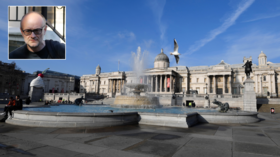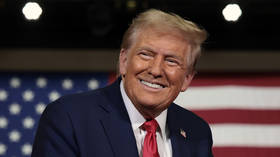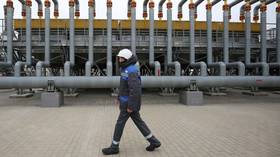Anti-establishment? Dominic Cummings’ contradictory testimony only enforces the global elite’s pro-lockdown narrative

In insisting Britain should have locked down earlier and harder in March 2020, Boris Johnson’s former chief adviser has gone from zero to hero in the eyes of those who hated him. But where’s the evidence it’d have saved lives?
It’s been quite a turnaround. Dominic Cummings was loathed by pro-Remainers and ‘centrists’ for his role in ‘getting Brexit done’ but now he’s being toasted as the ‘insider’ who spilled the beans in public on how incompetently PM Johnson and his health secretary handled Covid-19. All of a sudden ‘Bad Boy Dom’ is not so bad. He’s a credible, reliable source we should all be listening to.
Yet, while we can all probably agree about his verdict on the awful Matt Hancock (the late comedian Tony Hancock would probably have made a better health secretary – and he‘s been dead for 53 years), Cummings’ testimony on Wednesday to the House of Commons Health and Science Select Committees was highly contradictory. As Leo McKinstry pointed out in the Daily Express, he had a scattergun approach, but no smoking gun. The core thrust of his critique – that Boris Johnson didn’t take the novel coronavirus seriously enough, was mistakenly pursuing a policy of ‘herd immunity’, and should have locked the country down earlier and harder – is itself based on false assumptions, or, more precisely, ludicrously over-the-top modelling, which was disproved by real-life events in countries that didn‘t lock down.
Also on rt.com ‘No relation to reality’: PM Johnson dismisses ex-aide Cummings’ claims that his inept rule led to thousands of Covid-19 deathsCummings said it was clear in March 2020 that the NHS would soon be overrun. But was it? The question everyone should be asking is this: if Covid-19 were already in the UK in December 2019, as many experts allege and much anecdotal evidence suggests, then why wasn’t the NHS overrun in January or February 2020, the usual peak months for admissions for flu and upper respiratory tract infections? In fact, deaths in the first 15 weeks of 2020 were lower than in the same period in 2018.
On the government’s own website, it was posted that “as of 19 March 2020, Covid-19 is no longer considered to be a high consequence infectious disease (HCID) in the UK”. The statement noted that mortality rates were “low overall”.
Revealingly, the death rate goes above that in the aforementioned 2018 period only in week 16, in April, after lockdown had been imposed, and after the hospital discharge programme began on March 19. All this strongly indicates that general community transmission of coronavirus in early 2020 was indeed low, and what caused the surge in deaths were government actions taken in mid-March, in particular, the discharge of around 25,000 untested sick patients from hospitals into care homes.
When asked about this policy on Wednesday by Labour MP Graham Stringer, Cummings condemned it, but surely it was the very sending back of those people back into homes that caused a greater loss of life than the decision not to lock down earlier.
The claim, repeated by Dominic Cummings to MPs yesterday, that without a lockdown in March 2020 "the NHS is going to be smashed in weeks" is demonstrably false. Infections were declining even as the words were spoken. https://t.co/VhuVRKoG0X
— Toby Young (@toadmeister) May 27, 2021
Cummings said Johnson should have locked down the country again in September as cases started to rise. He revealed that in mid-September Chief Scientific Officer Sir Patrick Vallance and Chief Medical Officer Chris Whitty wanted a lockdown and he took their side while Johnson decided to do nothing. But why on earth would we need to lockdown in September, based on what ‘might‘ happen in the future? And contrary to what Cummings said, things did not get back to normal in July and August – social distancing remained and mandatory masks were brought in, even though deaths with Covid-19 had dropped to between zero and 20.
Nowhere in Cummings’ testimony was there any acknowledgment of the tremendous harm lockdowns do. His shtick was ‘there’s a new virus about and some scientists have done some modelling predicting loads of deaths, so let’s lock down hard and early’. Where was the critical thinking that should have asked, ‘Were these models realistic?’ and ‘What is the real cost of lockdowns?’. Nowhere does he seem to have asked or been asked, ‘Could the cure actually be worse than the disease?’. Saving lives? Today, we have world-leading oncologist Dr Karol Sikora warning us of a cancer ‘time bomb’ because of the record numbers of people who have had appointments and check-ups cancelled over the past 15 months while the focus has been on Covid-19.
With all of this noise, cancer patients continue to be forgotten.A group of us from across cancer services spoke with a number of MPs yesterday to highlight the cancer crisis.We're all agreed on the severity of the situation. Hopefully the message got across...
— Professor Karol Sikora (@ProfKarolSikora) May 27, 2021
If I’d been an MP questioning Cummings yesterday, I would have asked for his views on Sweden and Belarus, neither of which imposed a national lockdown and both of which have seen fewer deaths with coronavirus than countries that did.
I would also have asked for his opinion on those US states that have fully opened up, despite the dire warnings of the lockdown lobby, and that have seen cases and deaths fall.
Of course, much of Cummings’ testimony was about settling old scores, so his catty comments about the prime minister’s girlfriend, Carrie Symonds, who seems to have supplanted him as Johnson’s new Svengali, speak for themselves. The bigger picture was how the former special advisor used his seven hours in front of a microphone to normalise lockdowns. Perhaps the most disturbing view he shared was that, in dealing with Covid-19, Britain had needed a “dictator” to “push the boundaries of legality”.
In fact, what Britain had needed in March 2020 were calm and rational politicians and advisers who did not run around panic-stricken like Dad’s Army’s Lance Corporal Jones after Neil Ferguson walked in the room and announced, ‘I’ve done some modelling.’ Yes, checks and controls on arrivals from virus hotspots should have been introduced, as I called for at the time, but beyond that, the case has not been proven that a domestic lockdown – or any other restrictive measures – were needed.
The problem now, looking ahead, is that after Cummings’ testimony and the way most of the media covered it, it’s going to be much harder for Boris Johnson to announce a full lifting of restrictions on June 21 – indeed, an announcement that the prime minister was expected to make this week on the future of social distancing and masks has already been postponed.
Also on rt.com ‘It's lockdown what done it’: Is Boris lauding lockdowns because he's planning another for October? It certainly looks that wayAnd what will happen when we get to September again and the same Cassandra voices, who clearly don’t want life ever to get back to normal, start calling for another lockdown ‘to protect the NHS’. Will Johnson feel able to resist or delay it once more, even if he genuinely wants to?
Rather than taking on the power elites, via his promotion of lockdowns, Dominic Cummings, the punk Bolshevik, has ended up serving them. What an irony.
Like this story? Share it with a friend!
The statements, views and opinions expressed in this column are solely those of the author and do not necessarily represent those of RT.














